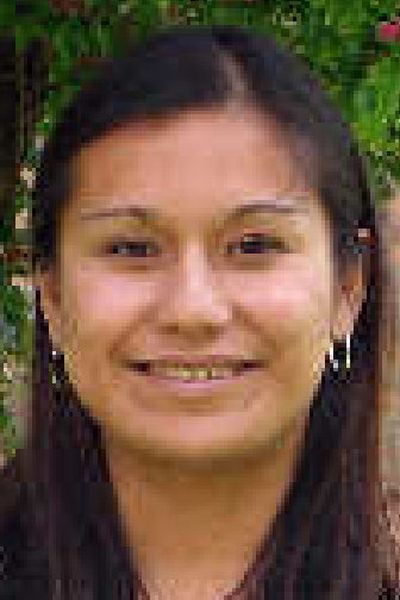Graduate focuses on Indian students

Alvina Cawston wants to find ways to bring more Native American students onto college campuses.
Then she wants them to go home.
Cawston – who graduates today from Eastern Washington University – is studying the experiences of other Native American students at Eastern and what obstacles they may face to completing their degrees. She hopes the work becomes part of a long career in researching issues relevant to Native Americans.
“I would like to see more Native American students on college campuses, and to see them return to their tribes to work for their people,” said Cawston, 25, a member of the Colville Confederated Tribes.
Cawston will be among hundreds of students who go through commencement exercises at EWU. As a McNair Scholar, she’s part of a program that encourages research and preparation for post-graduate work among underrepresented groups – and will enter the doctoral program in clinical psychology at Oklahoma State University this fall.
Cawston has made some preliminary presentations on her research project at conferences and seminars around the region, and she’ll speak to the Society of Indian Psychologists in June.
“She’s got more experience (with research) at the bachelor’s level than I ever had at the master’s level,” said Jackie Geddes, a professor who worked with Cawston on her research.
Cawston wanted to see if there was a lower retention rate among Native American students, and see what some of the reasons might be. She sent questionnaires about their experiences to undergraduates and alumni. The surveys are still being returned, so it’s not yet clear what she’ll find.
Cawston worked on an earlier study in which she analyzed the incidence of diabetes among children in the Colville tribe based on how much television they watched.
“It showed that children who watched more TV don’t have a higher incidence than children who don’t,” she said.
But, as part of her work with the McNair program, she realized that she could have improved her TV study. She had only asked kids whether they watched more or less than two hours of TV a day. In retrospect, she’d have sought more specific numbers from each person surveyed and would have asked them about their activity levels.
“In research, you don’t necessarily find the answer,” said Karen McKinney, professor and director of the McNair Scholars program. “You find more questions.”
Cawston’s interest in the retention of Native American students is largely unexplored academic territory, McKinney said. “There aren’t even articles being published that have the language down. It’s very cutting-edge,” she said.
The McNair program matches students with faculty mentors on a research internship. Gail Hicks, a psychology professor, is Cawston’s mentor. “It’s very exciting to be working with undergraduates,” she said. “They have a lot of enthusiasm and do creative work.”
EWU has been showcasing student research and creative work such as Cawston’s in recent years at an annual symposium. This year’s event in May included more than 170 students presenting work, ranging from research on the alarm calls of ground squirrels to studies of the possible effects of a public smoking ban. Creative works, such as writing and music, were also included.
Cawston grew up in Coulee Dam, and she earned an associate’s degree at Spokane Falls Community College before enrolling at EWU in fall 2002. She has a big family, and she expects to see a lot of them this morning at commencement.
“They’re very excited,” she said. “But they’re sad to see me leave to Oklahoma for five years.”